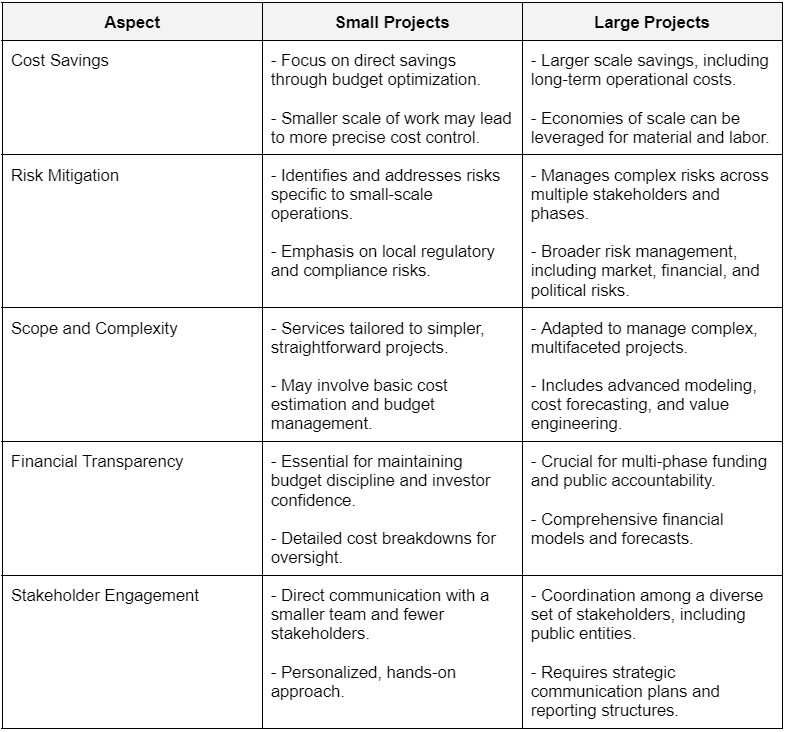- À Propos De Nous
- Services & Secteurs
- Projets
- Nos Employés
- Perspectives
- Carrières
- Académie DGJ

In the construction world, where deadlines are tight and budgets even tighter, cost control can make or break a project. From modest home refurbishments to complex commercial developments, one discipline continues to play a quietly powerful role behind the scenes—construction cost consulting.
Though often overlooked in favour of design or engineering, cost consultants are the financial stewards of the built environment. They ensure that construction doesn’t simply happen—it happens within the constraints of what’s financially feasible.
But how does this role differ between a small-scale local build and a sprawling international development? And does the value of cost consultancy shift depending on project size? Let’s take a closer look.
At its core, construction cost consulting involves managing, forecasting, and advising on the financial aspects of a building project. But this isn’t mere number-crunching. It’s about making strategic decisions that shape the viability and success of a scheme.
A skilled cost consultant doesn’t just estimate how much a structure will cost—they anticipate problems, guide procurement, and ensure the right balance between quality and affordability. These professionals are often chartered quantity surveyors in the UK, although the terms are sometimes used interchangeably.
Cost consultants become involved early in the project lifecycle. They’ll work closely with architects, engineers, developers, and contractors to create robust cost plans, monitor budgets, and ensure financial clarity.
It’s a discipline built on trust, precision, and a deep understanding of construction—not just on paper but in the real world.
Before we dive into how cost consulting operates across different project sizes, it helps to define what we mean by small and large projects.
Each comes with its own risks, constraints, and opportunities. And in both scenarios, construction cost consulting can prove invaluable in different ways.
In small projects, every pound matters. Budgets are more vulnerable to change, and unforeseen costs can put real pressure on the client’s ability to complete the job. This is where cost consultants bring significant value.
Their role may include:
Working with a cost consultant means peace of mind for many small developers or private clients. They don’t have to second-guess every line item in a builder’s quote or panic when a minor design tweak increases costs.
A good consultant will provide clarity, helping the client understand where the money is going and how to make smart decisions within their budget envelope.
Even something as simple as choosing a more efficient procurement route or advising on the sequencing of trades can result in considerable savings—both in money and in time.
Larger projects demand a more structured, strategic approach. Here, construction cost consulting becomes less about line-by-line cost-checking and more about comprehensive financial management.
These consultants will often be embedded within project teams, contributing not just to budgets but to the overall programme and design development. Their scope might include:
In these scenarios, cost consultants act almost as financial project managers. They ensure the client doesn’t lose sight of the numbers amid the chaos of design changes, stakeholder demands, and on-site pressures.
For example, in constructing a £50 million healthcare facility, even a 2% cost variance represents £1 million—enough to significantly impact funding, operations, or long-term viability. Here, the consultant’s role in risk management is just as critical as their budgeting skills.
When comparing the value of construction cost consulting across small and large projects, it's evident that while the scale and specifics of the services may vary, the underlying benefits—cost savings, risk mitigation, and financial transparency—remain universally significant.

Whether you’re building a two-bedroom cottage or a transport interchange, there’s one truth that holds: construction is expensive. And cost overruns can undo even the best-laid plans.
That’s why construction cost consulting isn’t just helpful—it’s essential.
From early feasibility to final account, a good consultant brings transparency, strategy, and confidence to the process. They’re the quiet constant on a noisy job site, the voice of reason when ambitions grow unchecked, and the steady hand that steers a project through market fluctuations, contract disputes, and unforeseen hiccups.
At DG Jones & Partners, we take pride in offering cost consultancy rooted in experience and tailored to your project—large or small. Our team brings clarity to complexity, ensuring you get the most value from every pound spent.
Contact DG Jones & Partners to see how our expertise in cost consulting can help your next project stay on track—financially and strategically.
What is construction cost consulting?
Construction cost consulting involves expert analysis and advice on the financial aspects of construction projects. These consultants help forecast project costs, identify potential financial risks, and suggest methods to maximize budget efficiency. This service is valuable for maintaining control over the budget from the project's conception to completion.
How does construction cost consulting differ between small and large projects?
The main difference lies in the scale and complexity of the financial oversight required. For small projects, cost consulting might focus more on direct cost-saving strategies and straightforward procurement processes. In contrast, large projects often require detailed risk assessments, sophisticated financial modelling, and continuous cost monitoring to effectively manage their extensive budgets and complex logistical challenges.
What are the key benefits of employing a construction cost consultant for a small project?
For small projects, a construction cost consultant can provide crucial insights into cost-effective purchasing, help avoid overruns, and ensure the project stays within budget. They also assist in securing fair pricing from contractors and suppliers, which can significantly impact the overall cost efficiency of the project.
Why is cost consulting particularly critical for large construction projects?
The financial stakes and potential risks are significantly higher in large projects, making cost consulting essential. Consultants in these scenarios play a vital role in strategic planning, implementing cost control measures, and performing regular cost audits to prevent budget overruns. Their expertise helps streamline expenses without compromising on the quality or scope of the project.
Can construction cost consulting help in improving the quality of construction?
Yes, construction cost consulting indirectly improves project quality by ensuring that budgets are used efficiently. By optimizing cost allocations, consultants can invest in higher-quality materials and skilled labour. They also help project managers make informed decisions that balance cost with quality outcomes.